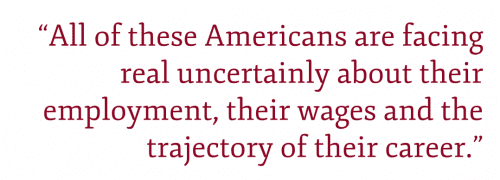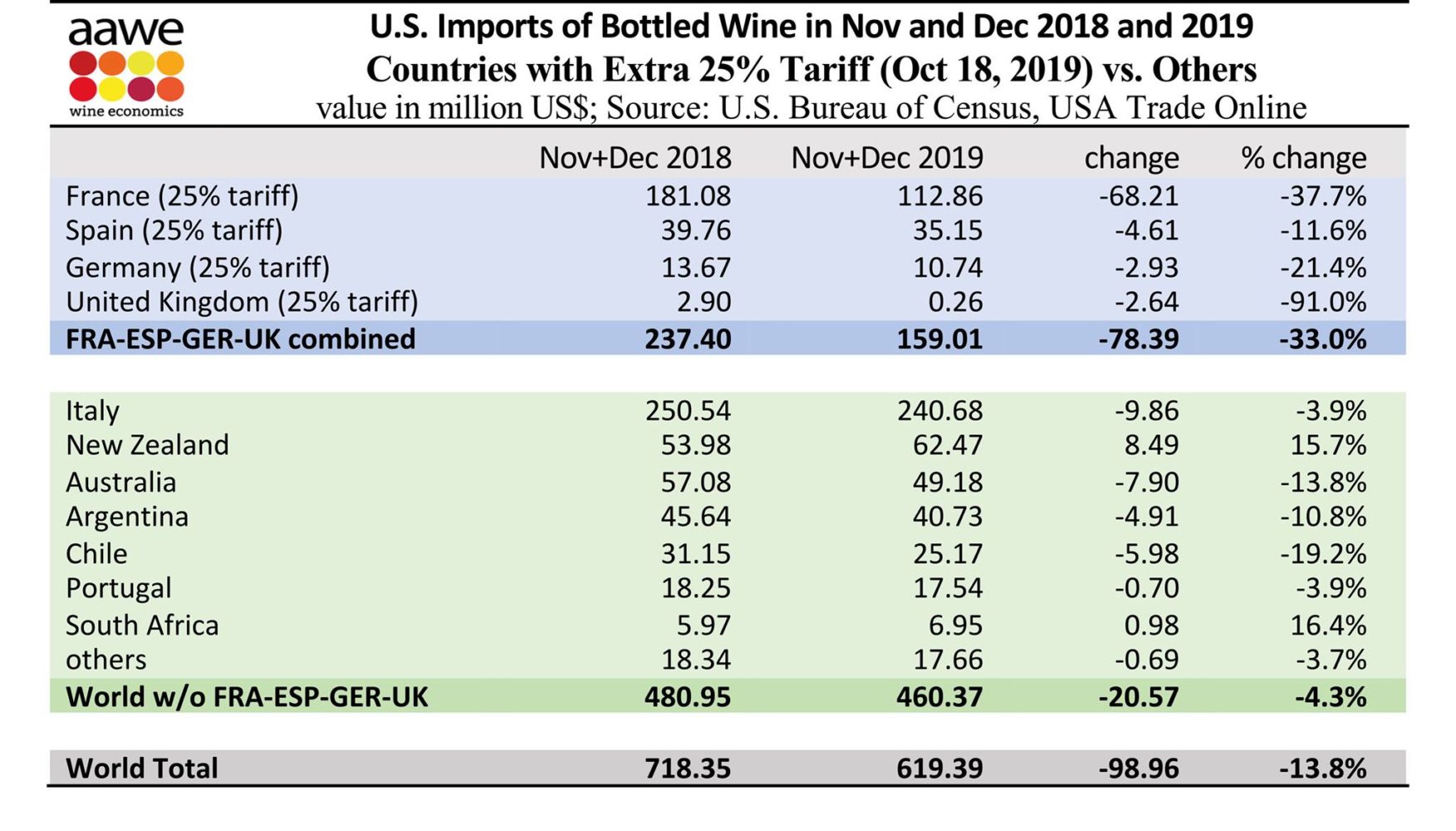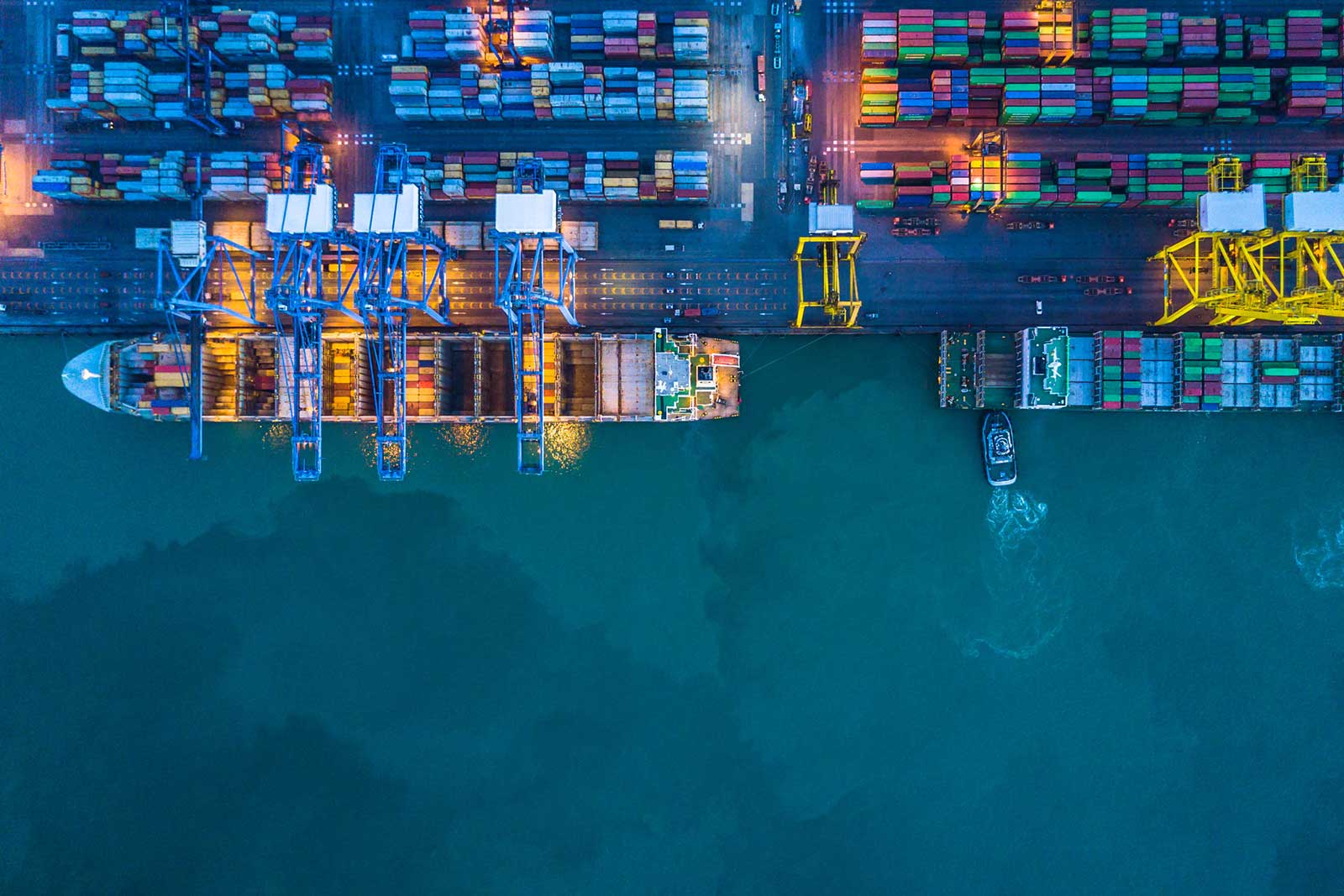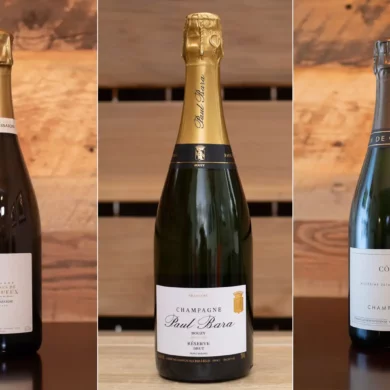Update to the update: Tariffs have been suspended on all European wine, but for archival purposes, we have opted to keep this story live. Learn more.
Update: On February 14, 2020, the United States Trade Representative issued — in essence — a renewal of the standing 25% tariff on French, Spanish, German and English wines. Additionally, the tariff on Airbus plane parts went from 10% to 15%.
The message that 100% tariffs would cripple the American wine industry (and would then have trickle-down effects across the restaurant and retail sectors) appears to have registered, and for that I am thankful. Many devoted members of the wine industry — lead by Harry Root, Kevin Rapp, Harmon Skurnik and many, many others whom I don’t have the room to call out here — lobbied hard for this action, and for that, every wine lover in America should be thankful.
However, this issue cannot be put to bed. The existing tariffs still hurt American businesses, hurt European wineries, and have the potential to cause lasting damage to consumer choice in arguably the world’s great wine market. Secondly, the European Union (EU) now needs to come to the plate and be willing to negotiate a settlement for the Airbus subsidies that have been deemed illegal. Furthermore, European countries who are considering digital service taxes — especially Italy — need to be aware that the U.S. Government will still gladly slap high tariffs on wines as retaliation for any economic policy that is considered biased towards American companies. Make of that tactic what you will, but the trade war is still far from over.
This is a reprieve, for the most part, and it could have been much worse. Unless a settlement is reached, we will be back at it in three months when the USTR action needs to be renewed, expanded or (hopefully) scrapped. Stay tuned, and stay involved.
I regret to interrupt our regularly scheduled editorial to bring you this news: the prospect of expanded tariffs on EU wines is not dead.
Despite promising news on January 20 that Donald Trump and Emmanuel Macron had made nice and “tabled tariffs,” that only pertained to the proposed French digital service tax tariff, which would have applied to Champagne and other French sparkling wines. The two leaders made no headway on resolving the larger, 15-year-long trade spat over aerospace subsidies, and so — like a festering wound on the industry — the prospect of an expanded 100% tariff on all European wines remains.
Speak Up, But Do It This Week
The smaller 25% tariff related to these subsidies is already knee-capping American importers, disrupting distribution chains, and rewarding Chinese and Middle Eastern markets. More on that in a minute, but first, here’s what you can still do: contact your U.S. Representative and U.S. Senators. Let your voice be heard (I have some facts and figures you can borrow to make your case below), but please do it this week. A decision in the case is expected by February 17, and since that is President’s Day, it could come as early as Friday. Our representatives and senators can no longer hide behind impeachment proceedings as a means to stall on this. It’s time for them to pat their head and rub their tummy at the same time, and act in a bi-partisan fashion to pressure the Trump Administration to table the tariffs.
Note: For both Representatives and Senators, calling their office and talking to a live person is the best way to get their attention. If you were flooded with calls, you’d complain to your superiors as well, wouldn’t you? From what I’ve heard, this is the main way they gauge public opinion on such issues.
Tariffs Are Already Hurting the U.S. Wine Industry
I wrote about this possibility when the tariff expansion proposal first came out in December. Back then, as an observer of the industry (read: not an economist), I could see a rather frightening domino effect on the American economy. Because of our three-tier system (importer/producer > distributor > seller) three businesses make money on a single bottle of wine. We can argue the merits of such a system another time, but because of this mandated-by-federal-law system, the pain of these tariffs is felt across a wide sector of the United States.
 And because of that, this is not just about wine drinkers losing out on their precious bottles of Burgundy and Barolo: its people who pound the pavement to sell wine, it’s people in shipping and logistics, it’s administrative and marketing staff at any of these companies, it’s trucker drivers and warehouse workers, it’s waitstaff with diminished tips, and it’s restaurant owners that rely on their European wine list to pull them into the black. All of these Americans are facing real uncertainly about their employment, their wages and the trajectory of their career. (Remember: the United States “won” the case in the WTO, so again: why are we doing this to ourselves?).
And because of that, this is not just about wine drinkers losing out on their precious bottles of Burgundy and Barolo: its people who pound the pavement to sell wine, it’s people in shipping and logistics, it’s administrative and marketing staff at any of these companies, it’s trucker drivers and warehouse workers, it’s waitstaff with diminished tips, and it’s restaurant owners that rely on their European wine list to pull them into the black. All of these Americans are facing real uncertainly about their employment, their wages and the trajectory of their career. (Remember: the United States “won” the case in the WTO, so again: why are we doing this to ourselves?).
In fact, there is mounting evidence that existing tariffs are already doing lasting damage to the American wine importation, distribution and retail industries.

In October, when the WTO levied its decision on Airbus, a tariff was issued by the United States as retaliation on the principal European members involved in the company: Germany, France, Spain and England. That tariff applied a 25% fee on wines below 14% alcohol-by-volume from those member states. Sparkling wine was exempt from the tariff. In a divide and conquer move, other EU countries felt the pain differently (e.g. Italian cheeses were hit with a tariff, but Italian wine was not).
That tariff action has already damaged sectors of the American wine industry, and the stated aim of inflicting pain on the EU economies — the intended target after all — appears to be wishful thinking.
As I speculated (again, based on simple observation), exports of French wine have now shifted to China to make up the difference. According to the Global Trade Atlas, within the first month of the tariff, case sales of wine from France to the U.S. dropped by 48%, while case sales from France to China grew by 35%. (French wine exports actually increased, too). I figured this would happen, but I’m surprised it happened within the first month.
U.S. imports of French wines have dropped 37.7% in a year when you compare November and December of 2018 (before the 25% tariff) to 2019 (after the 25% tariff). Over the same period, Spanish (-11.6%), German (-21.4%) and English wine (-91%) were also hit hard. Not all of this is attributed to the tariffs, but Italy, which was not included in the wine tariffs, only saw a -3.9% drop. It’s safe to assume that a majority of the drop comes from the tariff.

Now picture the tariff expanding to 100%. If that happens, these wines will simply stop coming here and, perhaps within the first month, start going to China and other markets. The Coronavirus epidemic adds yet another wrinkle to the story, but it is hard to imagine a scenario where this action wouldn’t cause lasting damage to the sector here in America.
So What Can You Do?
- Contact your U.S. Representatives and U.S. Senators. I have. It took me 4-5 minutes to call each.
- Contact the U.S. Trade Representative. Commenting has closed on the action, but you can still find a way to pester them if you’re tenacious.
- Support the wine industry reps who are lobbying Congress and marching against these tariffs in Washington DC. You can donate to this GoFundMe campaign to fund their lobbying and public relations efforts that will be ongoing beyond this week. Harry Root is the founder of the Alliance and he has taken leave of his wine business in Charleston, South Carolina to spend these crucial weeks in Washington DC where he has been lobbying Congress successfully, gaining bipartisan support for our efforts. Help keep him going.
If you are a retailer, importer, restaurant/wine bar, or wine educator:
- You can encourage your employees to contact members of their Congressional delegation to voice opposition to the Airbus tariffs.
- You can educate your staff on the facts about the tariffs. Bobby Stuckey MS does an eloquent job of that in this video with SommTV. (I’ve asked them to drop the paywall for it so more people can view it.)
- You can educate your clientele about the danger these tariffs pose to the very businesses they support and their own consumer choices. Again, urge them to contact members of their Congressional delegation.
- Make noise on Facebook, Twitter and Instagram. Please use these hashtags on all posts: #winetariffs #tariffied #notjustwine #saveourjobs
- Join the US Wine Trade Alliance Facebook group
If you are a wine producer:
- Ask your American importers to contact members of their Congressional delegation to voice opposition to the Airbus tariffs
- Send a letter to your government officials and consortia to put pressure on Paul Hogan and the EU president to negotiate a deal and exempt the wine industry from the Airbus tariffs. It should be noted that many aerospace industry watchers are projecting the WTO’s complaint on Boeing will come in much less than the Airbus judgment (translation: don’t hold out for an Even Steven deal, Europe. It might not materialize).
- Join the US Wine Trade Alliance Facebook group




